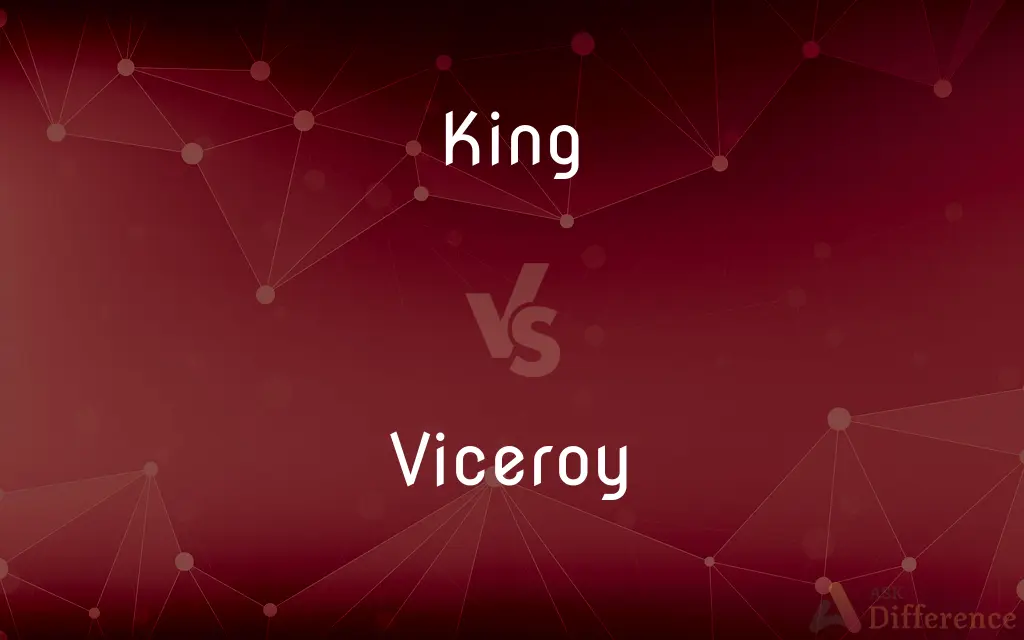King vs. Viceroy — What's the Difference?
Edited by Tayyaba Rehman — By Urooj Arif — Updated on March 31, 2024
A king is a monarch who rules a kingdom, often by hereditary right, while a viceroy is an official who governs a region in the name of and on behalf of a monarch.

Difference Between King and Viceroy
Table of Contents
ADVERTISEMENT
Key Differences
A king typically holds the highest sovereign authority over a kingdom or territory, with powers and responsibilities that vary from ceremonial roles to absolute governance, depending on the country's system of government. Whereas a viceroy acts as the representative of the sovereign in a colony or foreign territory, wielding authority delegated by the monarch but not possessing sovereignty themselves.
The title of king is often associated with a hereditary monarchy, where the position is passed down through family lines, often for life. On the other hand, the position of viceroy is usually appointed, and viceroys serve at the pleasure of the monarch, for a term that is not determined by lineage but by the monarch's decision.
Kings often embody the historical and cultural identity of their nations, serving as symbols of continuity and unity. In contrast, viceroys are more likely to be seen as administrators or managers of a territory, focusing on governance rather than symbolizing national identity.
While kings may enact laws, levy taxes, and govern directly or through a parliamentary system, viceroys typically carry out the directives of the monarchy, ensuring that colonial or overseas territories adhere to the policies and interests of the home country.
The distinction between a king and a viceroy also reflects their differing roles in diplomacy and international relations. Kings often have the authority to engage in diplomatic negotiations, declare war, or make peace. Viceroys, while they may represent the monarch in diplomatic affairs within their governed territories, do not usually have the sovereign authority to engage in diplomacy on behalf of the nation as a whole.
ADVERTISEMENT
Comparison Chart
Authority
Sovereign ruler of a kingdom
Representative governing on behalf of a monarch
Basis of Position
Often hereditary and for life
Appointed and serves at monarch's pleasure
Role in Governance
Can be absolute or ceremonial, enacts laws
Administers territory, enforces monarch's laws
Symbolism
Embodies national identity and continuity
Seen as an administrator of foreign territory
Diplomatic Authority
Engages in diplomacy, declares war
Limited to representing monarch in territory
Example
King Charles III of the United Kingdom
The Viceroy of India before 1947
Compare with Definitions
King
Sovereign ruler with hereditary title.
The king ruled over his kingdom with absolute authority.
Viceroy
Governs on behalf of a monarch.
The viceroy administered the colony as the monarch's representative.
King
Symbolizes national heritage and unity.
The king's coronation was a moment of national pride.
Viceroy
Serves as an intermediary between colony and crown.
The viceroy reported the colony's affairs back to the sovereign.
King
Engages in international diplomacy.
The king negotiated treaties with other nations.
Viceroy
Appointed to oversee foreign territories.
The viceroy was tasked with enforcing the king's laws overseas.
King
Represents the continuity of leadership.
The king's lineage has ruled for centuries.
Viceroy
Authority is delegated, not sovereign.
The viceroy's decisions could be overruled by the monarch.
King
Holds highest authority in governance.
The king signed new laws into effect.
Viceroy
Focuses on administration and governance.
The viceroy implemented policies to improve local infrastructure.
King
King is the title given to a male monarch in a variety of contexts. The female equivalent is queen, which title is also given to the consort of a king.
Viceroy
A viceroy () is an official who runs a polity in the name of and as the representative of the monarch of the territory. The term derives from the Latin prefix vice-, meaning "in the place of" and the French word roy, meaning "king".
King
A male sovereign.
Viceroy
A man who is the governor of a country, province, or colony, ruling as the representative of a sovereign.
King
One that is supreme or preeminent in a particular group, category, or sphere
"In many countries, soccer is the king of sports" (Cameron W. Barr).
Viceroy
An orange and black North American butterfly (Limenitis archippus), resembling but somewhat smaller than the monarch.
King
A man chosen as the winner of a contest or the honorary head of an event
A homecoming king.
Viceroy
One who governs a country, province, or colony as the representative of a monarch.
Ireland was governed by a Viceroy representing the English King/Queen when it was part of the United Kingdom of Great Britain and Ireland.
King
Abbr. K A playing card bearing the figure of a king, ranking above a queen.
Viceroy
A zongdu.
King
Abbr. K The principal chess piece, which can move one square in any direction and must be protected against checkmate.
Viceroy
An orange and black North American butterfly (Limenitis archippus), so named because it is similar to, but smaller than, the monarch butterfly.
King
A piece in checkers that has been moved to the last row on the opponent's side of the board and been crowned, thus becoming free to move both forward and backward.
Viceroy
The governor of a country or province who rules in the name of the sovereign with regal authority, as the king's substitute; as, the viceroy of India.
King
Kings(used with a sing. verb) See Table at Bible.
Viceroy
A large and handsome American butterfly (Basilarchia archippus syn. Limenitis archippus). Its wings are orange-red, with black lines along the nervures and a row of white spots along the outer margins. The larvæ feed on willow, poplar, and apple trees.
King
A king-size bed.
Viceroy
Governor of a country or province who rules as the representative of his or her king or sovereign
King
Principal or chief, as in size or importance.
Viceroy
Showy American butterfly resembling the monarch but smaller
King
Of or relating to a king-size bed
King sheets.
A king bed skirt.
King
To make (a piece in checkers) into a king; crown.
King
A male monarch; a man who heads a monarchy. If it is an absolute monarchy, then he is the supreme ruler of his nation.
Henry VIII was the king of England from 1509 to 1547.
King
A powerful or majorly influential person.
Howard Stern styled himself as the "king of all media".
King
Something that has a preeminent position.
In times of financial panic, cash is king.
King
A component of certain games.
King
(chess) The principal chess piece, that players seek to threaten with unavoidable capture to result in a victory by checkmate. It is often the tallest piece, with a symbolic crown with a cross at the top.
King
(card games) A playing card with the letter "K" and the image of a king on it, the thirteenth card in a given suit.
King
A checker (a piece of checkers/draughts) that reached the farthest row forward, thus becoming crowned (either by turning it upside-down, or by stacking another checker on it) and gaining more freedom of movement.
King
The central pin or skittle in bowling games.
King
A king skin.
Oi mate, have you got kings?
King
A male dragonfly; a drake.
King
A king-sized bed.
King
(graph theory) A vertex in a directed graph which can reach every other vertex via a path with a length of at most 2.
King
To crown king, to make (a person) king.
King
To rule over as king.
King
To perform the duties of a king.
King
To assume or pretend preeminence (over); to lord it over.
King
To promote a piece of draughts/checkers that has traversed the board to the opposite side, that piece subsequently being permitted to move backwards as well as forwards.
King
To dress and perform as a drag king.
King
A Chinese musical instrument, consisting of resonant stones or metal plates, arranged according to their tones in a frame of wood, and struck with a hammer.
King
A chief ruler; a sovereign; one invested with supreme authority over a nation, country, or tribe, usually by hereditary succession; a monarch; a prince.
Kings will be tyrants from policy, when subjects are rebels from principle.
There was a State without king or nobles.
But yonder comes the powerful King of Day,Rejoicing in the east
King
One who, or that which, holds a supreme position or rank; a chief among competitors; as, a railroad king; a money king; the king of the lobby; the king of beasts.
King
A playing card having the picture of a king{1}; as, the king of diamonds.
King
The chief piece in the game of chess.
King
A crowned man in the game of draughts.
King
The title of two historical books in the Old Testament.
King
To supply with a king; to make a king of; to raise to royalty.
Those traitorous captains of Israel who kinged themselves by slaying their masters and reigning in their stead.
King
A male sovereign; ruler of a kingdom
King
A competitor who holds a preeminent position
King
A very wealthy or powerful businessman;
An oil baron
King
Preeminence in a particular category or group or field;
The lion is the king of beasts
King
United States woman tennis player (born in 1943)
King
United States guitar player and singer of the blues (born in 1925)
King
United States charismatic civil rights leader and Baptist minister who campaigned against the segregation of Blacks (1929-1968)
King
A checker that has been moved to the opponent's first row where it is promoted to a piece that is free to move either forward or backward
King
One of the four playing cards in a deck bearing the picture of a king
King
(chess) the weakest but the most important piece
Common Curiosities
How does the authority of a king differ from that of a viceroy?
A king has sovereign authority and can make decisions on governance and diplomacy, while a viceroy's authority is delegated and focuses on administration.
Can a viceroy make independent decisions?
While viceroys can make administrative decisions, their actions must align with the monarch's directives and policies.
What is a king?
A king is a hereditary sovereign ruler of a kingdom, often possessing the highest authority in the land.
What role does a king play in a constitutional monarchy?
In a constitutional monarchy, a king often has ceremonial duties, with real political power residing in elected officials.
What is a viceroy?
A viceroy is an official appointed by a monarch to govern a colony, territory, or country in the monarch's name.
Can a viceroy become a king?
It's unlikely in traditional monarchies, as viceroys do not inherit sovereignty but are appointed officials.
Was the Viceroy of India a king?
No, the Viceroy of India was the representative of the British monarch, not a sovereign ruler.
What is the historical significance of viceroys?
Viceroys played crucial roles in managing empires' overseas territories, facilitating colonial administration and control.
What happens to a viceroy when a king dies?
A viceroy typically continues in their role, as their appointment is based on the monarchy, not the individual monarch.
Do kings and viceroys exist in modern times?
Kings remain in several countries, mainly in ceremonial roles. Viceroys are less common but similar roles exist as governors or administrators of territories.
How are viceroys chosen?
Viceroys are appointed by the monarch, usually based on their experience, loyalty, and ability to manage foreign territories.
What responsibilities did viceroys have?
Viceroys were responsible for enforcing the monarch's laws, collecting taxes, and managing local affairs.
How does the public view kings compared to viceroys?
Kings are often viewed with a sense of national identity and continuity, whereas viceroys are seen more as administrators.
Are there any countries with viceroys today?
The term "viceroy" is largely historical, but similar roles exist, such as governors-general, representing monarchs in Commonwealth realms.
How did viceroys influence the territories they governed?
Viceroys influenced local policies, economic development, and cultural exchanges, shaping the colonial legacy of their territories.
Share Your Discovery

Previous Comparison
Rend vs. Tear
Next Comparison
Get vs. GoAuthor Spotlight
Written by
Urooj ArifUrooj is a skilled content writer at Ask Difference, known for her exceptional ability to simplify complex topics into engaging and informative content. With a passion for research and a flair for clear, concise writing, she consistently delivers articles that resonate with our diverse audience.
Edited by
Tayyaba RehmanTayyaba Rehman is a distinguished writer, currently serving as a primary contributor to askdifference.com. As a researcher in semantics and etymology, Tayyaba's passion for the complexity of languages and their distinctions has found a perfect home on the platform. Tayyaba delves into the intricacies of language, distinguishing between commonly confused words and phrases, thereby providing clarity for readers worldwide.














































